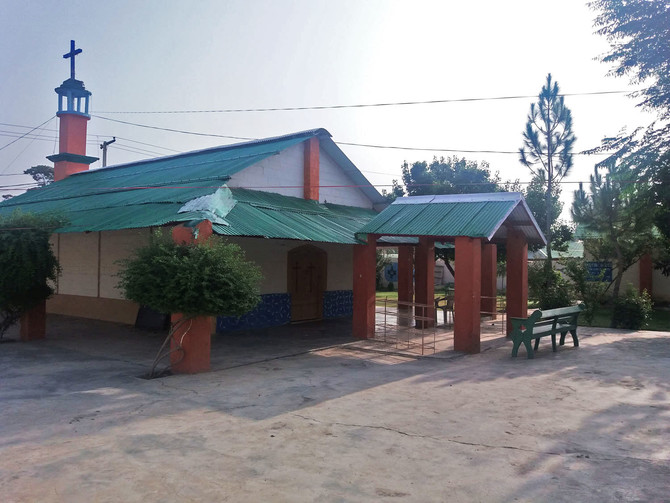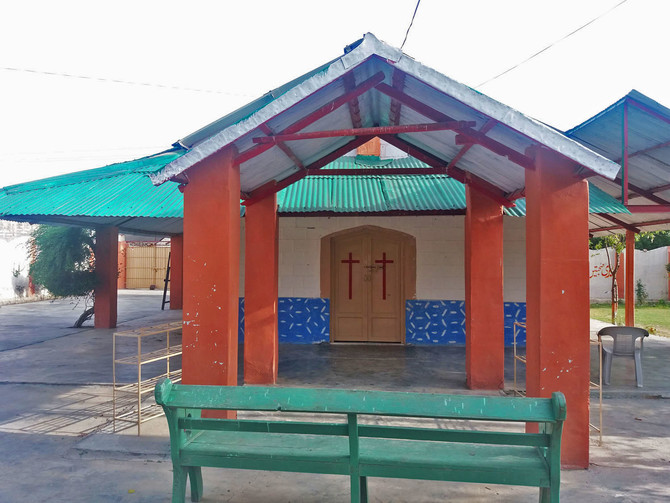WANA, South Waziristan: Members of a tiny Christian community in Pakistan’s northwest congregate in their church, surrounded by craggy mountainous terrain that was once infested with militant networks.
The building is at the heart of Wana -– the headquarters of South Waziristan Agency -– which was long regarded as a terrorist sanctuary and one of the most dangerous places in the world.
Until recently, it was part of the Federally Administered Tribal Areas (FATA) of Pakistan. But South Waziristan, along with six other agencies, has now been merged with the Khyber Pakhtunkhwa province.
The foundation stone of the church was laid in this area in January 2000 in a ceremony that brought together several civil and military officials. This was done in response to several requests from the Christian community that mostly resided in the South Waziristan Scouts’ camp.
The camp was set up during the British rule in this strategically important locality to tame the fiercely independent tribal population of the area. The church is near the central mosque, presenting a picture of peaceful coexistence among the followers of the two biggest Abrahamic religions.
The church is a single-story building with an eight-foot boundary wall. Inside, there is enough space for some 300 worshippers to gather for the service simultaneously.
The church has two gates and there are steel benches in the lawn that offer a panoramic view of the majestic but barren mountains of Wana.
In an interview, Pastor Zeeshan Alam, 32, said that more than 400 Christians had been living in Wana with the Muslim majority for decades without undergoing a single instance that could spark communal tensions.
“Our forefathers have been living here since the independence of Pakistan in 1947. We have our legal documents of FATA and get 5 percent recruitment quota in each department of South Waziristan. Our community members work in every department, such as the Frontier Constabulary, sanitation, health and local administration,” Alam added.
However, he said that the local administration should reserve a piece of land for the Christians of Wana so that his community could also own property.
The pastor has a masters degree in business administration. He has also received religious education from theological schools in Karachi and Gujranwala.
A devout Protestant, the soft-spoken pastor is highly respected among the local tribesmen who are known for respecting people of all faiths.
“The locals have never had any religious problem with the Christian community here. It is true that extremist forces have dominated this area in recent years. But they were mostly exogenous. The locals have no sectarian tendencies,” a tribal elder, Anwar Wazir, told Arab News.
Irfan Masih, member of the Christian community living in Islamabad, said he was pleasantly surprised to know about the existence of a church in the tribal region.
“Christians there should be given all the needed facilities because they discharge their duties in tough terrain to protect their homeland,” he added.
Alam said his community did not face security issues and local tribesmen got along quite well with the Christian community.
Despite a decade of Taliban-led insurgency, hundreds of Christians practice their religion at the Church in Wana, Wazir added.
Among the ordinary tribesmen, the pastor is a widely respected. “Alam is a gentleman. He is known for his kind nature and doesn’t interfere in local affairs,” Shah Nawaz, who owns a store in the locality, told Arab News.
Only a decade ago, this area witnessed a lot of extremist violence, forcing tribal families to migrate to down districts of the country.
“We are happy to have a church here because it signifies that tribal people believe in pluralism when it comes to minority religious communities,” Nawaz said.
A senior security official based in Wan, said the Christian community did not face security issues since their church was in a secure area.
Church that signifies peaceful coexistence in tribal territories
Church that signifies peaceful coexistence in tribal territories

- While extremist forces dominated Wana and turned it into a dangerous place for everyone, they were not indigenous to the territory
- Christians say the local administration must reserve a piece of land for them so that their community can also own property in the area
Two killed in suicide blast targeting security forces in Pakistan’s northwest

- Multiple people were injured in the attack in Bannu district of Khyber Pakhtunkhwa province
- It comes days after militants rammed explosive-laden vehicle into checkpost, killing 12 people
ISLAMABAD: Two security personnel, including an officer, were killed, while multiple others sustained injuries when a suicide blast targeted their vehicle in Pakistan’s northwestern Khyber Pakhtunkhwa (KP) province, a police official said.
The suicide bomber hit his explosive-laden motorbike into an armored vehicle of security forces in Sara Darga area of KP’s Bannu district, according to a local police official who requested anonymity.
No group immediately claimed responsibility for the attack, but the Pakistani Taliban, or the Tehreek-e-Taliban Pakistan (TTP), have carried out similar assaults in the region in past.
“The attack had damaged the armored vehicle, causing deaths and injuries,” he told Arab News, adding that they suspected the Pakistani Taliban to be behind the attack.
Pakistan has struggled to contain a surge in militancy in KP, which borders Afghanistan, in recent years, with militant groups, particularly the TTP, frequently targeting security forces, law enforcers and government officials in the region.
Earlier this week, Pakistani Taliban militants rammed an explosive-laden vehicle into a checkpost jointly manned by security forces and law enforcement agencies in KP’s Bajaur district, killing 11 security personnel among 12 people, the Pakistani military’s media wing said.
Islamabad accuses Afghanistan of allowing the use of its soil and India of backing militant groups for cross-border attacks against Pakistan. Kabul and New Delhi deny this.













